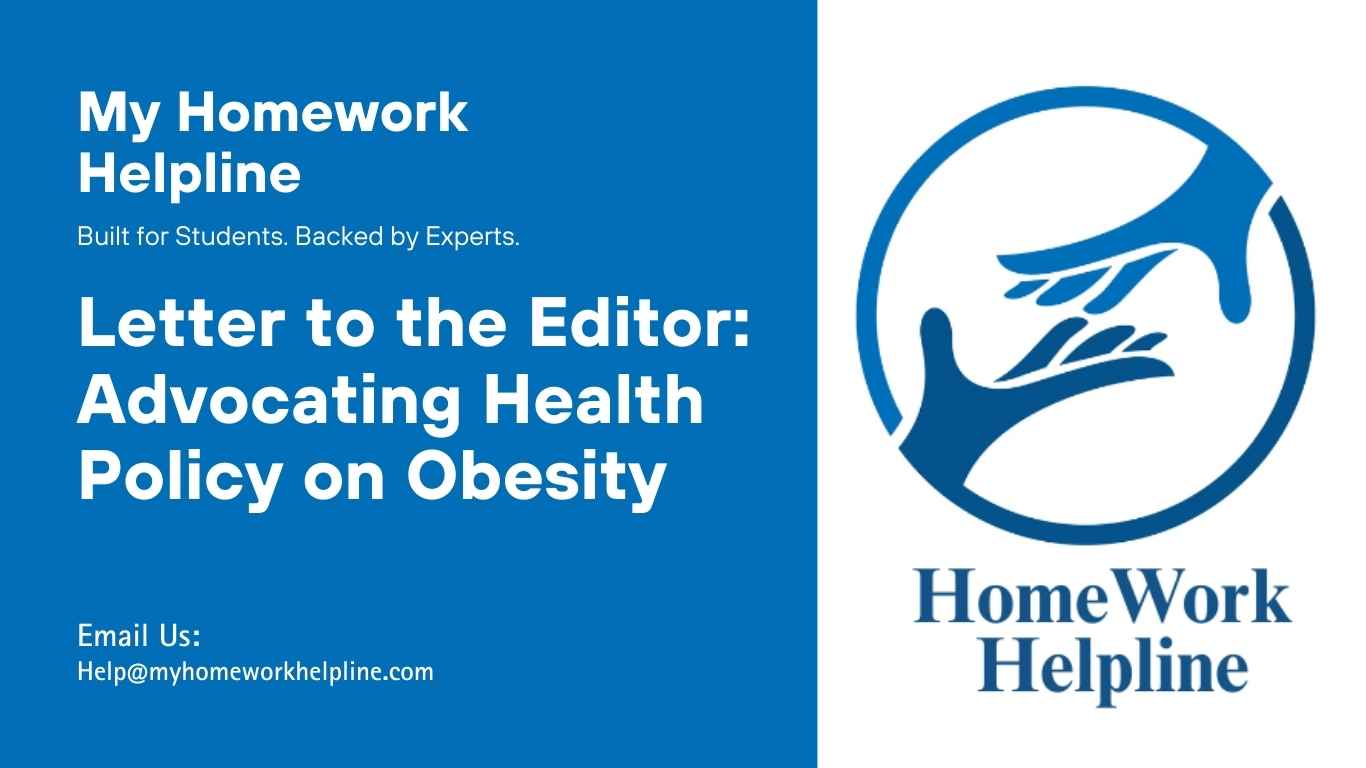Letter to the Editor Essay: Population Health Policy Advocacy on Obesity
Current State of Obesity in the US
Obesity as a disorder refers to the presence of excessive body fat that may cause health problems. According to CDC (2023), obesity is a complex issue that happens when the health weight of an individual is surpassed by his or her normal weight. The current state of Obesity in the US is high, especially in children leading to serious health problems. CDC (2023) states that the prevalence of obesity in the US for adolescents and children between 2017 and 2020 was 19.7%. The global state of obesity is that the condition is steadily affecting children, especially those who reside in Urban areas.
Development of Health Policy for Obesity in the US
Currently, there are public policy approaches that are considered significant for obesity prevention and their implementation can benefit all rather than focusing on changing a person’s behaviors one at a time (Chriqui, 2013). The issue is that current policies focus on school environments. The paper aims to focus on a policy that implies to all, rather than to a section group of the population.
Struggling with your population health policy advocacy letter essay or nursing assignment on obesity prevention? My Homework Helpline provides professional assignment and homework assistance, delivering human-written, plagiarism-checked essays with detailed reports. Gain expert guidance on writing a compelling letter to the editor essay by using our services at Nursing Homework Helpline, offering reliable support to US and worldwide students seeking academic success.
Preventing Obesity via Enhanced Quality of Care
Organizations associated with health care may help empower individuals with knowledge pertaining to the health issues associated with obesity via making awareness active efforts. Measures to prevent and treat obesity will be clarified suppose the public is well-informed. Forming a committee composed of health specialists and senior nurses to ensure that the programs are organized effectively and regularly. At these programs, trained physicians would talk about the risks associated with obesity, and nurses would describe the effective measures to prevent or handle obesity cases.
Further, it is important to monitor people with obesity to ensure that they are implementing measures to help them reduce the excess body fat that is associated with chronic diseases such as diabetes and heart problems (Batsis et al., 2021). To address this, the policy mandates that individuals should be involved in regular physical exercise on daily basis. Healthcare professionals will monitor obese individuals to ensure they are avoiding junk food that leads to unnecessary weight gain as well as they are involved in physical exercise daily.
How the Policy Will Support Achievement of Desired Outcomes
The requirements of the proposed policy would require significant expenditure to effectively implement programs to raise awareness and educate people. Further, it could also be argued that the expenses incurred on the patients’ side would be significant as equipment for conducting the physical exercise. The patients may incur expenses via the acquirement of various equipment required to help with the physical exercise practice. The above arguments regarding the additional patients’ expenses associated with adopting the policy raise significant concerns regarding the practical application of the policy; however, these costs could potentially benefit individuals’ overall well-being as well as result in significant positive social change. A society with individuals with fit bodies tends to be a healthy one (Batsis et al., 2021).
Policy Development Advocacy
The policy would provide people with information that can be applied to all people regardless of age or gender. Individuals who will observe this policy will be able to prevent health risks associated with obesity. Further, such a policy would build trust and garner more positive change in time.
References
Batsis, J. A., Apolzan, J. W., Bagley, P. J., Blunt, H. B., Divan, V., Gill, S., … & Kidambi, S. (2021). A systematic review of dietary supplements and alternative therapies for weight loss. Obesity, 29(7), 1102-1113.
CDC (2023). Childhood obesity facts. Retrieved from https://www.cdc.gov/obesity/data/childhood.html
Chriqui, J. F. (2013). Obesity prevention policies in US states and localities: lessons from the field. Current obesity reports, 2, 200-210.
Appendix
Journal Guidelines
Journal Name: Obesity Prevention Policies in U.S. States and Localities: Lessons from the Field. Submission Guidelines for Letters to the Editor: The submission requirements for editors include an original manuscript that is not supposed to be published elsewhere in any language. The co-authors ought to have made a significant contribution to research design based on analysis and interpretation of data and have declared all competing interests. The authors should declare suppose their content is used or published elsewhere. The work has to comply with the Ethical Policies of Obesity. The length of a research article may not exceed 60,000 characters including space character counts.

